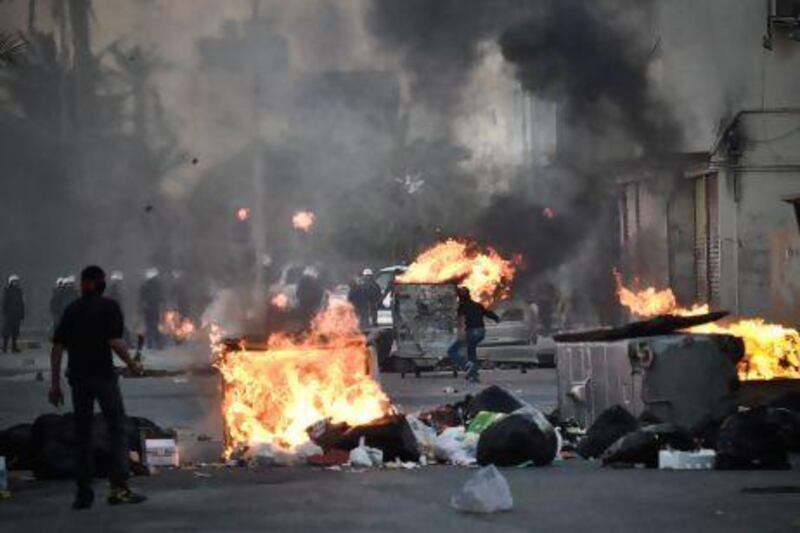MANAMA // Clashes between security forces and protesters left a 16-year-old boy dead and wounded dozens more yesterday, on the second anniversary of Bahrain’s uprising.
Opposition groups called for protests and a shopping boycott to commemorate the anniversary of the Arab Spring-inspired uprising for political reforms in the kingdom. Youth groups called for a general strike.
Shortly after dawn, altercations broke out between protesters and government forces in Shiite communities across the island. Police fired tear gas and buckshot, while protesters hurled petrol bombs.
“The revolution was reborn in the youth today,” said Abbas, 40, a protester in Sitra. “I could feel it from the morning.”
The casualties occurred in the predominantly Shiite village of Al Daih, west of the capital, the interior ministry confirmed, adding it would investigate the incident.
Hussain Al Jazeeri, was struck in the stomach by birdshot and later pronounced dead.
Clashes escalated after news of Hussain’s death spread on social media.
In Sitra, the scene of some of the heaviest turmoil in the past two years, the roads were left scorched from burning tyres and billowing tear-gas canisters.
Protesters built up barricades of rocks, plywood and felled trees to prevent security forces from entering the area by car. Police broke up protests on foot and by using tear gas.
The largest opposition bloc, the mainly Shiite Al Wefaq, said on its website that dozens of others had been hurt.
At the entrances of Al Daih, Sitra and other Shiite communities across the island, authorities used police SUVs, water cannon and tanks to stop demonstrators getting to central Manama and the former Pearl Roundabout, the focus of protests two years ago.
Protestersrs were expected to come out in force at Hussain’s funeral today.
Streets near the city centre were quiet through the morning but clashes broke out in villages near the site of the Pearl Roundabout in the afternoon, sending huge plumes of smoke over central Manama.
Central Manama remained quiet. The February 14 youth movement called for a general strike yesterday, while Al Wefaq called for a boycott of all non-emergency shopping and business transactions.
“Al Wefaq has asked people to avoid public ministries and shopping,” said Jasim Hussein, a former Wefaq politician. “It’s not a strike, but it’s a peaceful way to show that there is a problem.”
It was not immediately clear whether the boycott and strike calls were widely observed.
In a bid to show the protests were causing no disruptions Bahrain’s prime minister, Prince Khalifa bin Salman Al Khalifa, visited Manama’s City Centre shopping mall, local media reported.
The government's information affairs authority urged parents to keep their children at school and "go about their daily routine".
The Bahrain Independent Commission of Inquiry (BICI), commissioned at the request of King Hamad to examine the height of the unrest, blamed the government for using disproportionate force against demonstrators.
“The second report of the unit in charge of follow up of the BICI recommendations included details of death cases alleged to be related to the events up to November 5, 2012, Bahrain’s public prosecution reported on February 8.
“The number of those cases reached 92, including the 46 cases referred to in the BICI report.”
An international inquiry commission said in a report in November 2011 that 35 people had died during Bahrain’s uprising.
The Bahrain Centre for Human Rights estimates 4,000 Bahrainis have been arrested, with 1,600 of those still in prison.
About 600 of those have been charged or sentenced, while the rest remain in detention without charge, said Said Al Muhafdah, head of the centre’s documentation department.
Just hours before the anniversary clashes began, delegates representing pro-government and opposition political societies held the second round of reconciliation talks aimed at breaking the deadlock of the country’s political crisis.
In a sometimes tense five-hour session, delegates agreed to several ground rules for the talks, which are expected to last for months.
In particular, they agreed their recommendations would go straight to the king for his approval, bypassing the country’s parliament, said Sawsan Taqawi, a member of the Shura Council and delegate to the talks.
In Sunday evening’s opening talks, an alliance of pro-government groups asked opposition groups to renounce violence, which means ending the informal street protests that often lead to clashes with police.
The measure was postponed with opposition groups pointing out that they had issued a declaration late last year denouncing all uses of violent resistance.
Since Arabian Gulf forces led by Saudi Arabia intervened to help the Bahraini government to quell huge anti-government demonstrations about a month after they began in 2011, small-scale protests have continued almost daily.
Some in the opposition have called for an end to the monarchy and are opposed to the reconciliation talks.
But most of the mainstream political opposition favours a constitutional monarchy and an end to discrimination of the Shiite majority – an allegation the Sunni-dominated government denies.
edickinson@thenational.ae
twitter: For breaking news from the Gulf, the Middle East and around the globe follow The National World. Follow us





